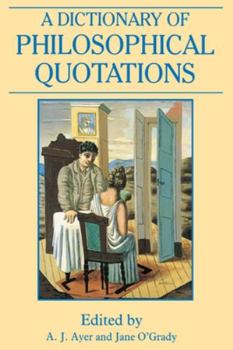A Dictionary of Philosophical Quotations
Select Format
Select Condition 
Book Overview
This dictioanry is the first to anatomize the philosophical tradition and to show the thoughts, paradoxes, errors and breakthroughs that underlie human speculation. Organized alphabetically by... This description may be from another edition of this product.
Format:Paperback
Language:English
ISBN:0631194789
ISBN13:9780631194781
Release Date:June 1994
Publisher:Wiley-Blackwell
Length:544 Pages
Weight:1.67 lbs.
Dimensions:1.2" x 6.0" x 9.0"
Customer Reviews
3 ratings
A MUCH-NEEDED, EXCEPTIONALLY HELPFUL VOLUME
Published by Thriftbooks.com User , 14 years ago
The idea to "compile a dictionary of philosophical quotations" originally came from famed analytic philosopher A.J. Ayer (e.g., Language, Truth and Logic), and he spent several months soliciting contributions from his philosophical colleagues (28 "major contributors" and 24 "other contributors"; weighted in favor of English analytic philosophers, which explains a certain "slant" in the selections, that other reviewers have noted) prior to his death in 1989. His literary executors obtained the services of writer Jane O'Grady to complete the project, and she did a fine job. The selections are arranged alphabetically by author's last name (or ONLY name, as in "Epicurus"), and generally include all quotations from a single book in sequence, before moving on to another book. Book title, section, page number, and in some cases translator citations are given, so that one can look up the quote for oneself (a notable deficiency in most "Famous Quotes" collections). This is not a "perfect" collection; some well-known quotations are omitted (e.g., Santayana's quote from Reason in Common Sense: The Life of Reason Volume 1 (v. 1), "Those who cannot remember the past are condemned to repeat it"); some worthy philosophers are virtually omitted (philosopher of science Imre Lakatos is limited to a single quotation), while some "questionable" figures are included (Gurdjieff and Ouspensky get a page each); and one can certainly question the relative amount of space given to some philosophers vis-à-vis others (e.g., Plato gets 11-1/2 pages, while Aristotle gets 7; Nietzsche gets 10 pages, but Kierkegaard only 4; Merleau-Ponty gets 7 pages, while Ryle gets less than 2; Hume and Kant each get about 12 pages). Such caveats aside, for those of us who ask ourselves, "Now, in which book did Feyerabend say, 'Anything goes'?" or "What is the exact wording of Kant's 'starry heavens above' quote?" you may well find this book indispensable. HIGHLY RECOMMENDED!
an excellent tool for locating & dissecting great minds
Published by Thriftbooks.com User , 23 years ago
Since the dawn of time there have been many great thinkers who have discussed may great topics. It would take me many more years than I have to find my through all of their readings. Therefore, I have been searching for a tool that can help me to navigate philosophical thought. This text does it well, Alfred Jules Ayer and Jane O'grady, who have already traveled down the same road that I am just starting on, have put together a incomparable piece of literature that can serve as a "roadmap" if you will, of philosophical thought. With this, I can read summaries of many thinkers readings and use the maticulous reference section to obtain the works of the thinkers who have most intrigued me. It also is listed alphabetically by authors name rather than topic which seems to be the standard for most other philosophical reference guides. This will provide the more experienced philosophers an excellent reference guide with a different means of query.
The only source for truly useful quotations.
Published by Thriftbooks.com User , 24 years ago
In the course of competitive debate, there arises a need for quotations to support one's point of view. Reading the actual books and excerpting them takes far more time than is available, so summaries become necessary. This leaves one two options: quote dictionaries or 'beginner's guides.' the latter include few actual quotations, just the voice of some omniscient narrator stating his opinion. quote dictionaries have a diffeent failing: they are full of 'literary merit' and 'popular idiom', but they contain relatively few quotations of actual substance. this book is the answer. it is so well edited that i could follow the philosophers entire train of thought in his own words without parentheticals. it even includes an excellent index and is very modestly priced for a book of this magnitude. if you've ever had the desire to understand all the philosophers, great and obscure, in their own words, then reference them handily, this is the book for you.




